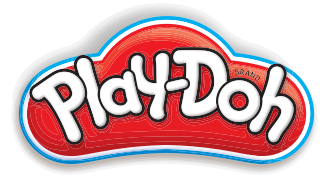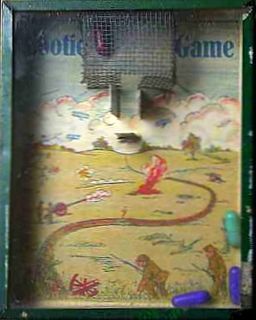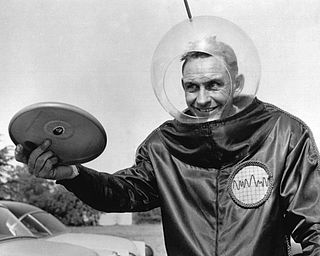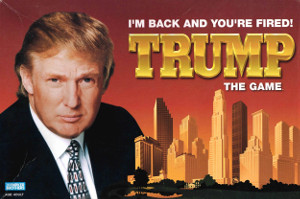Related Research Articles

A frisbee is a gliding toy or sporting item that is generally made of injection molded plastic and roughly 8 to 10 inches in diameter with a pronounced lip. It is used recreationally and competitively for throwing and catching, as in flying disc games. The shape of the disc is an airfoil in cross-section which allows it to fly by generating lift as it moves through the air. Spinning the disc imparts a stabilizing gyroscopic force, allowing it to be both aimed with accuracy and thrown for distance.

Parker Brothers was an American toy and game manufacturer which later became a brand of Hasbro. More than 1,800 games were published under the Parker Brothers name since 1883. Among its products were Monopoly, Cluedo, Sorry!, Risk, Trivial Pursuit, Ouija, Aggravation, Bop It, and Probe. The trade name became defunct with former products being marketed under the "Hasbro Gaming" label. However, in 2017, Hasbro revived the brand with the release of several new games which bear similarities with those of some of its previous, better-known products.

Play-Doh is a modeling compound used by young children for arts and crafts projects at home. It is composed of flour, water, salt, borax, and mineral oil. The product was first manufactured in Cincinnati, Ohio, United States, as a wallpaper cleaner in the 1930s. The product was reworked and marketed to Cincinnati schools in the mid-1950s. Play-Doh was demonstrated at an educational convention in 1956 and prominent department stores opened retail accounts. Advertisements promoting Play-Doh on influential children's television shows in 1957 furthered the product's sales. Since its launch on the toy market in the mid-1950s, Play-Doh has generated a considerable amount of ancillary merchandise such as The Fun Factory. In 2003, the Toy Industry Association named Play-Doh in its "Century of Toys List".

Wham-O Inc. is an American toy company based in Carson, California, United States. It is known for creating and marketing many popular toys for nearly 70 years, including the Hula hoop, Frisbee, Slip 'N Slide, Super Ball, Trac-Ball, Silly String, Hacky sack and Boogie Board.

Cooties is a fictitious childhood disease, used in the United States and Canada as a rejection term and an infection tag game. It is similar to the British dreaded lurgi, and to terms used in the Nordic countries, in Italy, Australia and New Zealand. A child is said to "catch" cooties through close contact with an "infected" person or from an opposite-sex child of a similar age.

Charles Brace Darrow was an American best known as the reputed inventor of the Monopoly board game, which was based on Elizabeth Magie's original design of The Landlord's Game. He became the first millionaire game designer in history.

Alfred Carlton Gilbert was an American inventor, athlete, magician, toy-maker and businessman. Gilbert is best known as the inventor of the Erector Set.

Elizabeth J. Phillips was an American game designer, writer and Georgist. She invented The Landlord's Game, the precursor to Monopoly, to illustrate teachings of the progressive era economist Henry George.

Rich Uncle Pennybags is the mascot of the game Monopoly. He is depicted as a portly old man with a moustache who wears a morning suit with a bowtie and top hat. In large parts of the world he is known, additionally or exclusively, as the Monopoly Man, or Mr. Monopoly. He also appears in the related games Advance to Boardwalk, Free Parking, Don't Go to Jail, Monopoly City, Monopoly Junior, and Monopoly Deal.

A Super Ball is a toy bouncy ball based on a type of synthetic rubber invented in 1964 by chemist Norman Stingley. It is an extremely elastic ball made of Zectron which contains the synthetic polymer polybutadiene as well as hydrated silica, zinc oxide, stearic acid, and other ingredients. This compound is vulcanized with sulfur at a temperature of 165 °C and formed at a pressure of 3500 psi. The resulting Super Ball has a very high coefficient of restitution, and if dropped from shoulder level on a hard surface, a Super Ball bounces nearly all the way back; thrown down by an average adult, it can leap over a three-story building.

Bill Stern was a U.S. actor and sportscaster who announced the nation's first remote sports broadcast and the first telecast of a baseball game. In 1984, Stern was part of the American Sportscasters Association Hall of Fame's inaugural class which included sportscasting legends Red Barber, Don Dunphy, Ted Husing and Graham McNamee. He was inducted into the National Radio Hall of Fame (1988) and has a star in the Hollywood Walk of Fame.

Walter Fredrick "Fred" Morrison was an American inventor and entrepreneur, who invented the Frisbee.
Philip E. Orbanes is an American board game designer, author, founding partner and former president of Winning Moves Games in Danvers, Massachusetts. Orbanes is a graduate of the Case Institute of Technology. He was a Senior Vice President for Research and Development at Parker Brothers until the 1990s. Orbanes has also served as Chief Judge at U.S. National and World Monopoly tournaments.
Super Elastic Bubble Plastic was the brand name for a children's toy manufactured from the 1970s through the 80s by Wham-O. It consisted of a tube of viscous plastic substance and a thin straw used to blow semi-solid bubbles. A pea-sized amount of liquid plastic was squeezed from the tube and made into a ball. One end of the straw was then inserted into the ball, and the user would blow into the other end, inflating the plastic into a bubble. The bubble could then be removed from the straw by pinching the hole closed, sealing the air inside.
TriBond is a board game that has sold over 3 million copies in 14 countries since its release in 1990. It requires players to determine a common bond between three subjects. It follows in the tradition of Trivial Pursuit, Outburst and other adult boardgames that require a wide range of knowledge but TriBond requires some problem solving ability as well.

The board game Monopoly has its origin in the early 20th century. The earliest known version of Monopoly, known as The Landlord's Game, was designed by an American, Elizabeth Magie, and first patented in 1904 but existed as early as 1902. Magie, a follower of Henry George, originally intended The Landlord's Game to illustrate the economic consequences of Ricardo's Law of Economic rent and the Georgist concepts of economic privilege and land value taxation. A series of board games was developed from 1906 through the 1930s that involved the buying and selling of land and the development of that land. By 1933, a board game had been created much like the modern version of Monopoly sold by Parker Brothers and its related companies through the rest of the 20th century, and into the 21st. Several people, mostly in the midwestern United States and near the East Coast of the United States, contributed to the game's design and evolution.
Winning Moves Games is a maker of classic card games and board games, puzzles, action games and adult party games. The company is known for game reproduction, republishing and variants like Monopoly: The Mega Edition.
A Roller Racer, or Flying Turtle as it was originally named by the inventor, is a toy human-powered vehicle for children. It was invented in the 1970s by a retired Boeing engineer as a gift for his grandson, using a tractor seat for the prototype toy. The vehicle consists of an injection-molded, polyethylene seat with rear wheels, attached to a T-style handlebar by a pin joint. The handlebars also have wheels, attached to what would be the vertical portion of the "T". In the 1980s the Roller Racer was sold under the WHAM-O brand name Dragonfire, but has been manufactured by Mason Corporation of Brentwood, Tennessee since January 1987.

Trump: The Game is a board game named after American businessman and President Donald Trump. Milton Bradley Company initially released the game in 1989, although it sold poorly, with only 800,000 copies sold out of an expected two million. Following the success of Trump's 2004 reality television series, The Apprentice, Parker Brothers re-released Trump: The Game later that year.
References
- 1 2 3 O'Keeffe, Tim (September 16, 2004). "Alumnus -- a game inventor and author -- won't be denied". Colgate University. Archived from the original on November 25, 2018. Retrieved August 28, 2010.
- 1 2 3 4 5 Allers, Jeff (August 1, 2008). "Postcards From Berlin #31: Refusing to Grow Up". Boardgame News. Retrieved August 28, 2010.[ dead link ]
- ↑ Entry for Wham-O Super-Book: Celebrating 60 Years Inside the Fun Factory on Amazon.com
- ↑ Orbanes, Philip E. (2006). Monopoly: The World's Most Famous Game—And How it Got that Way (1st ed.). Da Capo Press. p. 179. ISBN 0-306-81574-5.